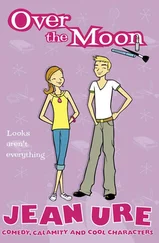John Galsworthy - Over the River
Здесь есть возможность читать онлайн «John Galsworthy - Over the River» весь текст электронной книги совершенно бесплатно (целиком полную версию без сокращений). В некоторых случаях можно слушать аудио, скачать через торрент в формате fb2 и присутствует краткое содержание. Жанр: Классическая проза, на английском языке. Описание произведения, (предисловие) а так же отзывы посетителей доступны на портале библиотеки ЛибКат.
- Название:Over the River
- Автор:
- Жанр:
- Год:неизвестен
- ISBN:нет данных
- Рейтинг книги:3 / 5. Голосов: 1
-
Избранное:Добавить в избранное
- Отзывы:
-
Ваша оценка:
- 60
- 1
- 2
- 3
- 4
- 5
Over the River: краткое содержание, описание и аннотация
Предлагаем к чтению аннотацию, описание, краткое содержание или предисловие (зависит от того, что написал сам автор книги «Over the River»). Если вы не нашли необходимую информацию о книге — напишите в комментариях, мы постараемся отыскать её.
Over the River — читать онлайн бесплатно полную книгу (весь текст) целиком
Ниже представлен текст книги, разбитый по страницам. Система сохранения места последней прочитанной страницы, позволяет с удобством читать онлайн бесплатно книгу «Over the River», без необходимости каждый раз заново искать на чём Вы остановились. Поставьте закладку, и сможете в любой момент перейти на страницу, на которой закончили чтение.
Интервал:
Закладка:
The cab drew up at the hotel. “Wait, please!” Entering its discreetly gilded hall, she stood for a moment at a loss. The setting seemed unsuitable for private trouble.
“Yes, madam?” said a page-boy’s voice.
“Could you find out for me, please, if my brother-inlaw, Sir Gerald Corven, is in the hotel?”
What should she say if they brought him to her? Her figure in its evening cloak was reflected in a mirror, and that it was straight filled her with a sort of surprise—she felt so as if she were curling and creeping this way and that. But they did not bring him to her. He was not in his room, nor in any of the public rooms. She went out again to her cab.
“Back to Mount Street, please.”
Dornford and Adrian were gone, her Aunt and Uncle playing piquet.
“Well, Dinny?”
“I couldn’t get into her rooms, and he was not in his hotel.”
“You went there?”
“It was all I could think of to do.”
Sir Lawrence rose. “I’ll telephone to Burton’s.” Dinny sat down beside her Aunt.
“I feel she’s in trouble, Auntie. Clare’s never rude.”
“Kidnapped or locked up,” said Lady Mont. “There was a case when I was young. Thompson, or Watson—a great fuss. Habeas corpus, or something—husbands can’t now. Well, Lawrence?”
“He hasn’t been in the Club since five o’clock. We must just wait till the morning. She may have forgotten, you know; or got the evening mixed.”
“But she told Mr. Dornford that they would meet again.”
“So they will, tomorrow morning. No good worrying, Dinny.”
Dinny went up, but did not undress. Had she done all she could? The night was clear and fine and warm for November. Only a quarter of a mile or so away, was that backwater of Mews—should she slip out and go over there again?
She threw off her evening frock, put on a day dress, hat and fur coat, and stole downstairs. It was dark in the hall. Quietly drawing back the bolts, she let herself out, and took to the streets. When she entered the Mews—where a couple of cars were being put away for the night—she saw light coming from the upper windows of No. 2. They had been opened and the curtains drawn aside. She rang the bell.
After a moment Clare, in her dressing-gown, opened the door.
“Was it you who came before, Dinny?”
“Yes.”
“Sorry I couldn’t let you in. Come up!”
She led the way up the spiral stairs, and Dinny followed.
Upstairs it was warm and light, the door into the tiny bathroom open, and the couch in disorder. Clare looked at her sister with a sort of unhappy defiance.
“Yes, I’ve had Jerry here, he’s not been gone ten minutes.”
A horrified shiver went down Dinny’s spine.
“After all, he’s come a long way,” said Clare; “good of you to worry, Dinny.”
“Oh! darling!”
“He was outside here when I got back from the Temple. I was an idiot to let him in. After that—oh! well, it doesn’t matter! I’ll take care it doesn’t happen again.”
“Would you like me to stay?”
“Oh! no. But have some tea. I’ve just made it. I don’t want anyone to know of this.”
“Of course not. I’ll say you had a bad headache and couldn’t get out to telephone.”
When they were drinking the tea Dinny said:
“This hasn’t altered your plans?”
“God! no!”
“Dornford was there to-night. We thought it best to tell him you were having a difficult time.”
Clare nodded.
“It must all seem very funny to you.”
“It seems to me tragic.”
Clare shrugged, then stood up and threw her arms round her sister. After that silent embrace, Dinny went out into the Mews, now dark and deserted. At the corner leading into the Square she almost walked into a young man.
“Mr. Croom, isn’t it?”
“Miss Cherrell? Have you been at Lady Corven’s?”
“Yes.”
“Is she all right?”
His face was worried, and his voice anxious. Dinny took a deep breath before answering:
“Oh! yes. Why not?”
“She was saying last night that man was over here. It worries me terribly.”
Through Dinny shot the thought: ‘If he’d met “that man”!’ But she said, quietly:
“Walk with me as far as Mount Street.”
“I don’t mind your knowing,” he said, “I’m over head and ears in love with her. Who wouldn’t be? Miss Cherrell, I don’t think she ought to be in that place alone. She told me he came yesterday while you were there.”
“Yes. I took him away with me, as I’m taking you. I think my sister should be left to herself.”
He seemed to hunch himself together.
“Have YOU ever been in love?”
“Yes.”
“Well, then you know.”
Yes, she knew!
“It’s absolute torture not to be with her, able to see that she’s all right. She takes it all lightly, but I can’t.”
Takes it all lightly! Clare’s face looking at her! She did not answer.
“The fact is,” said young Croom, with incoherence, “people can say and think what they like, but if they felt as I feel, they simply couldn’t. I won’t bother her, I really won’t; but I can’t stand her being in danger from that man.”
Dinny controlled herself to say quietly: “I don’t think Clare’s in any danger. But she might be if it were known that you—” He met her eyes squarely.
“I’m glad she’s got you. For God’s sake look after her, Miss Cherrell.”
They had reached the corner of Mount Street, and she held out her hand.
“You may be certain that whatever Clare does I shall stick by her. Good-night! And cheer up!”
He wrung her hand, and went off as if the devil were after him. Dinny went in, and slid the bolts quietly.
On what thin ice! She could hardly drag one foot before the other as she went upstairs, and sank down on her bed exhausted.
CHAPTER 11
When Sir Lawrence Mont reached Burton’s Club the following afternoon he was feeling, in common with many who undertake to interfere in the affairs of others, an uneasy self-importance coupled with a desire to be somewhere else. He did not know what the deuce he was going to say to Corven, or why the deuce he should say it, since, in his opinion, by far the best solution would be for Clare to give her marriage another trial. Having discovered from the porter that Sir Gerald was in the Club, he poked his nose gingerly into three rooms before locating the back of his quarry seated in the corner of an apartment too small to be devoted to anything but writing. He sat down at a table close to the door, so that he could simulate surprise when Corven came up to leave the room. The fellow was an unconscionable time. Noting a copy of the British Statesman’s vade-mecum beside him, he began idly looking up the figures of British imports. He found potatoes: consumption sixty-six million five hundred thousand tons, production eight million eight hundred and seventy-four thousand tons! Somebody the other day had written to say that we imported forty million pounds’ worth of bacon every year. Taking a sheet of paper he wrote: “Prohibition and protection, in regard to food that we CAN produce here. Annual Imports: Pigs, £40,000,000; Poultry say, £12,000,000; Potatoes—God knows how much! All this bacon, all these eggs, and half these potatoes could be produced here. Why not a five-year plan? By prohibition lessen the import of bacon and eggs one-fifth every year, and the import of potatoes by one-tenth every year, increasing home production gradually to replace them. At the end of five years our bacon and eggs and half our potatoes would be all-British. We should save eighty millions on our Imports Bill and our trade would practically be balanced.”
Taking another sheet of paper, he wrote:
Читать дальшеИнтервал:
Закладка:
Похожие книги на «Over the River»
Представляем Вашему вниманию похожие книги на «Over the River» списком для выбора. Мы отобрали схожую по названию и смыслу литературу в надежде предоставить читателям больше вариантов отыскать новые, интересные, ещё непрочитанные произведения.
Обсуждение, отзывы о книге «Over the River» и просто собственные мнения читателей. Оставьте ваши комментарии, напишите, что Вы думаете о произведении, его смысле или главных героях. Укажите что конкретно понравилось, а что нет, и почему Вы так считаете.












